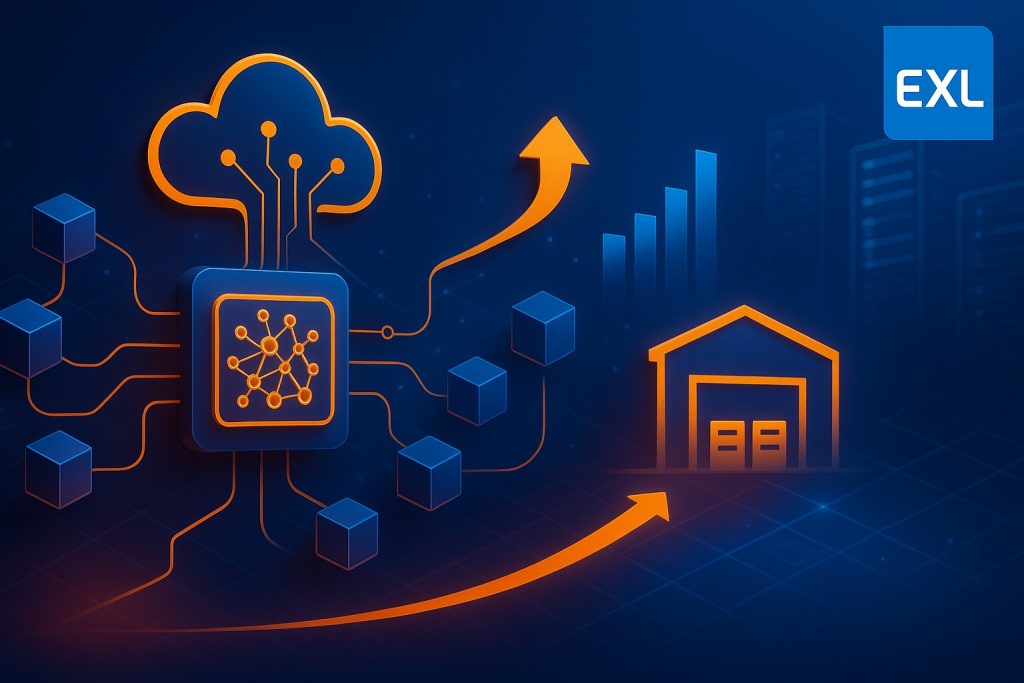EXL introduced EXLdata.ai on October 7, 2025—an agent-driven, AI-native data operations suite developed in partnership with Databricks to eliminate critical obstacles preventing companies from scaling artificial intelligence implementations. The announcement arrives as organizations grapple with data accessibility: EXL’s 2025 Enterprise AI Study found just 30% of companies maintain enterprise-wide data access.
The modular platform leverages Databricks Agent Bricks and Unity Catalog to unify data modernization, governance, and unstructured data handling throughout the entire data lifecycle. EXL’s research indicates 65% of enterprises face difficulties processing unstructured data, which comprises 85% of all corporate information.

Targeting the Core Barrier to AI Adoption
EXLdata.ai addresses what industry experts identify as the primary impediment to artificial intelligence deployment: making enterprise data AI-ready and accelerating organizations’ ability to embed intelligent solutions into workflows. The solution employs purpose-built AI agents that autonomously handle discovery, migration, engineering, governance, annotation, labeling, and operations across all data lifecycle stages.
“EXLdata.ai changes the equation for enterprises, redefining how organizations prepare their data for AI consumption,” said Rohit Kapoor, EXL’s Chairman and CEO. “By breaking down information silos, enhancing data transparency, and effectively managing unstructured data, we’re transforming the data foundation for our clients.”
The announcement coincides with accelerating agentic AI adoption across corporate environments, where 89% of surveyed CIOs consider agent-based AI a strategic priority. Recent industry analysis shows over 80% of companies are using or exploring AI, yet only one in four AI initiatives actually delivers expected return on investment.
Partnership Strategy and Market Positioning
Barry Dauber, VP of GenAI GTM Strategy at Databricks, emphasized the collaboration’s market significance: “EXL’s solution running on Databricks Agent Bricks provides ready-made agents, annotation, and observability capabilities that help customers enrich data sources, improve model accuracy, and operationalize AI within workflows.”
EXL reported strong financial performance preceding this launch, with $6.87 billion market capitalization and 15% year-over-year revenue growth. The company raised its 2025 revenue guidance to $2.05-2.07 billion and announced a $125 million accelerated share repurchase program earlier this year.
Built on open architecture, the EXLdata.ai platform integrates with existing client systems without replacing current investments, enabling deployments measured in weeks rather than months. The solution targets industries including insurance, healthcare, banking, retail, and energy, positioning EXL to capture growing demand for AI-ready data infrastructure solutions.
Understanding the Unstructured Data Problem
The 85% figure for unstructured data’s share of enterprise information reveals a fundamental challenge most AI initiatives face. Unlike structured databases with neat rows and columns, unstructured data includes documents, emails, images, videos, social media content, and sensor feeds—information lacking predefined formats that traditional database systems can easily process.
Machine learning models require clean, labeled, consistently formatted data for training. When 85% of corporate data exists in formats AI systems can’t directly consume, organizations face massive preprocessing challenges before they can even begin building models. This explains why data preparation typically consumes 60-80% of data scientists’ time in most AI projects.
EXL’s agent-based approach attempts to automate this preprocessing work. Rather than data teams manually discovering, cataloging, cleaning, and labeling unstructured data sources, AI agents handle these tasks autonomously. The effectiveness of this automation directly determines whether the platform delivers on its promise of accelerating AI deployment timelines.
The Agent-Based Operational Model
Agent Bricks represents Databricks’ framework for building autonomous AI agents that perform specific data operations. EXLdata.ai layers industry-specific and function-specific agents on this foundation, creating what EXL describes as ready-to-deploy solutions for common enterprise data challenges.
These agents don’t just execute predefined scripts—they’re designed to make decisions about how to handle data based on context, quality, and intended use. For instance, a data discovery agent might identify customer information scattered across CRM systems, email archives, call center recordings, and support tickets, then automatically catalog these sources and flag quality issues requiring attention.
The autonomous nature matters because manual data cataloging doesn’t scale. Enterprises generate new data sources constantly—new applications, acquired companies, partner integrations, IoT deployments. Traditional approaches where data teams manually inventory and prepare each source create bottlenecks that slow AI initiatives to a crawl.
Integration Without Disruption
EXL’s emphasis on open architecture integration addresses a practical concern organizations face when evaluating new data platforms: they’ve already invested heavily in existing systems. Databricks, Snowflake, cloud data warehouses, on-premises databases, analytics tools—replacing this infrastructure would cost millions and take years.
The platform’s ability to work alongside existing investments rather than requiring wholesale replacement reduces adoption friction. Organizations can start with specific use cases—perhaps preparing customer data for a chatbot or financial data for fraud detection models—without committing to enterprise-wide migration projects.
This incremental adoption model also limits risk. Rather than betting the entire data strategy on a new platform, companies can validate value in contained deployments before expanding scope. The “weeks not months” deployment claim suggests EXL has streamlined common integration patterns, though actual timelines will vary based on each organization’s complexity.
Financial Performance Context
EXL’s strong financial position—$6.87 billion market cap, 15% revenue growth, raised guidance—provides resources for continued platform development and customer support. Companies evaluating enterprise software increasingly consider vendor financial stability, particularly for strategic infrastructure like data platforms where switching costs run high.
The $125 million share repurchase program signals management confidence in future performance, though it also reduces cash available for R&D or acquisitions. For potential customers, the financial health matters less than whether the platform solves their specific data challenges, but vendor stability does factor into long-term technology decisions.
Industry-Specific Applications
EXL’s focus on insurance, healthcare, banking, retail, and energy reflects industries where unstructured data challenges prove particularly acute. Healthcare organizations struggle with clinical notes, medical imaging, and research literature. Insurance companies process claims documents, policy forms, and loss reports. Banks handle loan applications, compliance documents, and transaction records.
Each industry has domain-specific data preparation requirements. Medical data requires HIPAA compliance and specialized medical terminology handling. Financial data demands regulatory compliance and fraud detection capabilities. Retail data spans product catalogs, customer reviews, and supply chain documentation.
Whether EXLdata.ai’s industry-specific agents deliver sufficient depth in these domains or require substantial customization will determine adoption rates. Generic data preparation tools often struggle with specialized requirements that domain experts understand intuitively but AI systems need explicitly programmed.
ROI Challenges in Enterprise AI
The statistic that only 25% of AI initiatives deliver expected ROI highlights the gap between AI hype and operational reality. Organizations launch AI projects with ambitious goals but struggle to move pilots into production, scale successful prototypes, or measure actual business impact.
Data readiness represents just one factor in this success rate, though a fundamental one. Even the most sophisticated models fail if fed poor-quality, inconsistent, or biased training data. EXLdata.ai positions itself as addressing this foundational layer, but success requires more than just prepared data—it demands clear use cases, appropriate algorithms, change management, and organizational readiness.
The platform’s value proposition essentially argues: “Fix the data foundation and your AI success rate improves.” That logic holds if data quality was indeed the primary limiting factor for failed initiatives. If projects failed due to unclear business objectives, inappropriate algorithms, or organizational resistance to AI-driven insights, better data preparation alone won’t rescue them.

What Organizations Should Consider
Companies evaluating EXLdata.ai or similar platforms need clarity on their specific data challenges before committing resources. Questions worth asking include:
- What percentage of our data remains inaccessible to AI systems due to format or quality issues?
- Do we have clear AI use cases waiting on better data, or are data problems preventing us from even identifying viable applications?
- Can our current data team handle preparation work, or does automation become necessary for scale?
- Do industry-specific requirements demand specialized data handling our generic tools can’t provide?
- What integration complexity exists between this platform and our current infrastructure?
The 30% enterprise-wide data access figure from EXL’s study suggests most organizations face significant data fragmentation. Whether agent-based automation proves more effective than traditional data engineering approaches, or merely replaces one set of challenges with another, will emerge as more companies deploy these systems and share results.
For now, EXLdata.ai represents another entry in the crowded field of platforms promising to make AI implementation easier by solving data preparation challenges. The partnership with Databricks provides technical credibility, and EXL’s industry expertise offers potential advantages in specialized sectors. Whether it delivers transformative results or becomes another tool requiring extensive customization depends on execution quality that only production deployments will truly test.




Post a comment